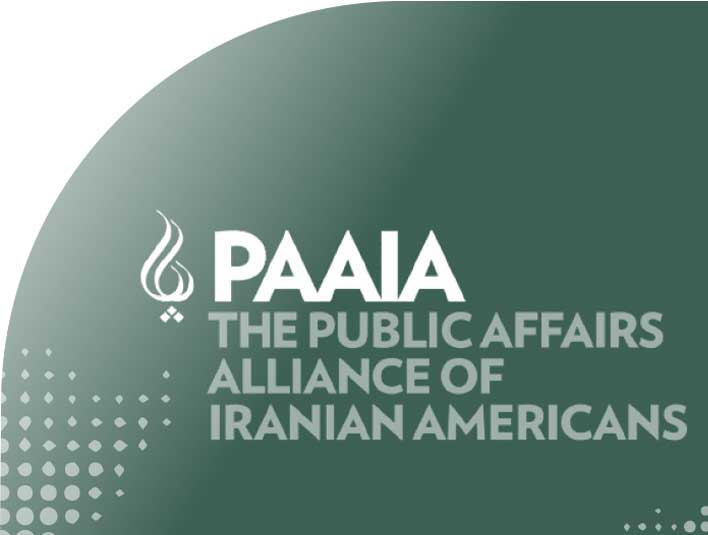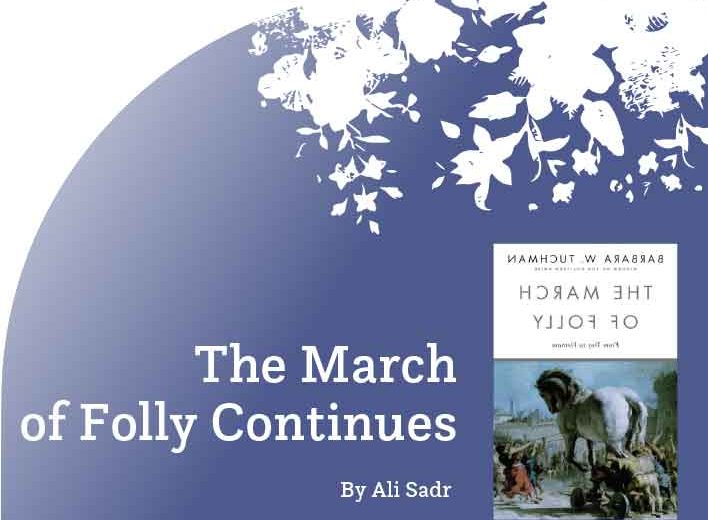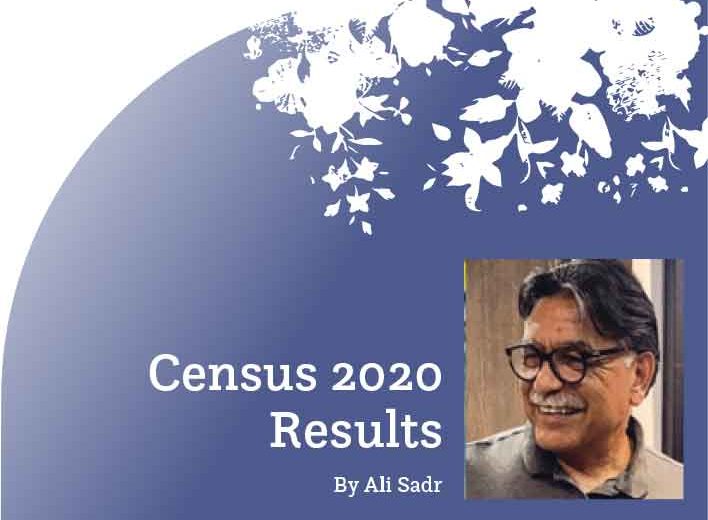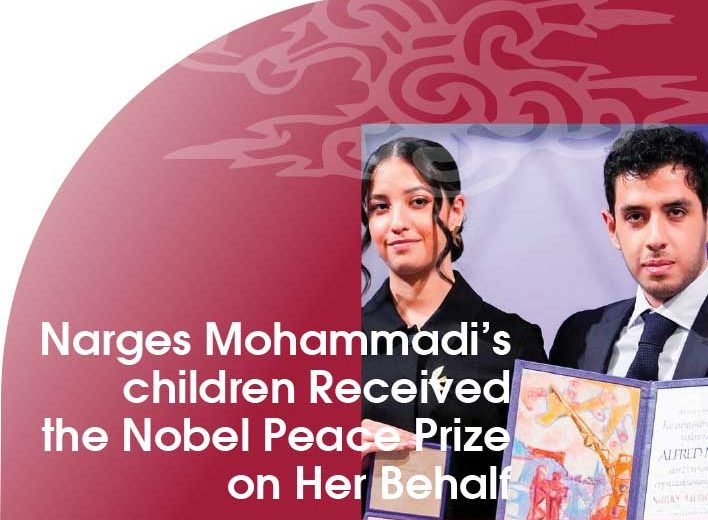2023 National Public Opinion Survey of the Iranian American Community
2023 National Public Opinion Survey of the Iranian American Community
Every year the Public Affairs Alliance of Iranian Americans (PAAIA) conducts a survey among Iranian Americans about various issues concerning the community. As far as we know, this is the only such survey done by any entity and for any purpose. The following is the executive summary of the 2023 survey that was published last February. One of the interesting points about this survey is the comparison of the opinions with the previous surveys. We share this information without expressing any opinion. We strongly recommend that our readers refer to the actual survey at PAAIA’s website (www.paaia.org) for more comprehensive information.
-Peyk
——————————————————————————-
Press Release
Dear Friend,
We are thrilled to share with you the findings of our 2023 National Public Opinion Survey of Iranian Americans!
PAAIA’s survey, conducted by Zogby Research Services, is the only scientific poll of the Iranian American community that captures valuable insights into how our community feels in this pivotal moment, and what our priorities and concerns are. The survey is particularly timely, as it comes nearly six months since the tragic death of Mahsa Amini and amidst ongoing protests in Iran.
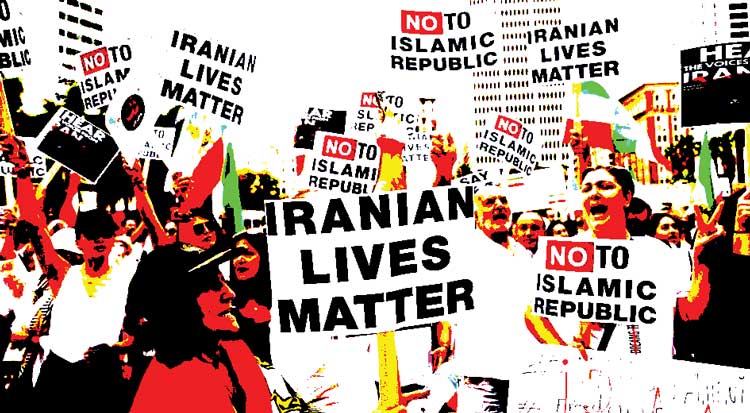
Here are some key takeaways from the survey:
Connections & Communications with Family in Iran
Connections between the Iranian American community and family in Iran remain close. Almost half of survey respondents (47%) have an immediate family member in Iran, and only 6% have no family there.
Communication between Iranian Americans and their connections in Iran is robust, despite recent barriers created by the Iranian government. 80% report they are having a negative impact on their communications. More than 4 in 10 communicate with family and friends in Iran at least several times per week.
More than 9 in 10 Iranian Americans expressed concern about personal safety of their family and friends in Iran.
The importance of easing immigration and tourist visas is significant for Iranian Americans. An overwhelming 92% support the outline of the Temporary Family Visitation Act (TFVA).
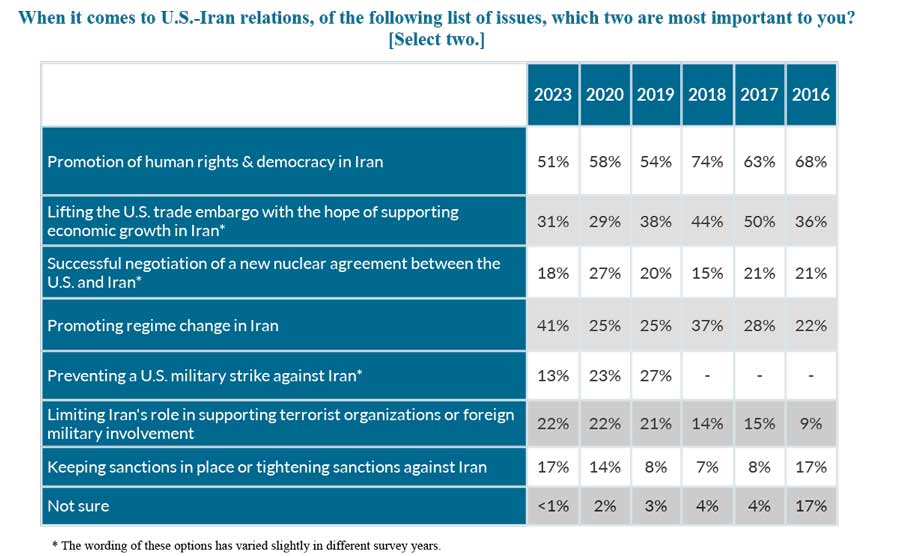
U.S.-Iran Relations
When asked about President Biden’s handling of U.S.-Iran relations, 75% of Iranian American respondents give the president negative ratings, while only 23% give his handling of Iran positive ratings. Political party affiliation makes no difference to the attitudes of respondents.
The top issue for Iranian Americans with respect to U.S.-Iran relations, regardless of party affiliation, continues to be the promotion of human rights and democracy in Iran (51%). This is followed by “promoting regime change” (41%)—up 16 points from 2020.
When asked which option Iranian Americans favor regarding making a deal with Iran, 41% prefer a more comprehensive deal that would address Iran’s nuclear ambitions, its regional engagement, and human rights violations, while 38% reject the notion of deal-making altogether. Support for returning to the JCPOA has been cut in half (15%) since 2020.
9 in 10 respondents believe the recent protests will make a positive contribution to Iran’s socio-political evolution and are in favor of the U.S. government doing something to support the protestors. But there is no clear consensus on how best to accomplish this, with supporting Internet access (38%) and banning Iran’s leadership and their families from getting visas to the U.S. (34%) as the top two choices.
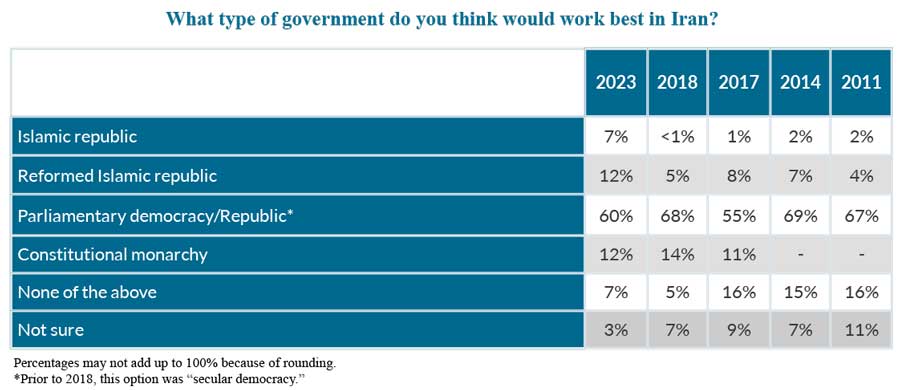
Iran’s Government & Leadership
A parliamentary democracy/republic (60%) remains the preferred type of government for Iran. Half of respondents believe a grassroots democratic movement is the approach most likely to move Iran toward a more democratic society, followed by covert/military action (18%). The two least preferred options among survey respondents are reform through current political structure (17%) and economic sanctions (13%).
Human rights attorney Nasrin Sotoudeh (+26%), Crown Prince Reza Pahlavi (+20%), and Iranian soccer coach and former player Ali Karimi (+20) are the Iranian leaders with the highest net favorability, while Iran’s President Ebrahim Raisi (-55%), Leader of the MEK and the National Council of Resistance Maryam Rajavi (-46%), and former reformist politician and prime minister Mir-Hossein Mousavi (-36%) have the lowest.
Thanks to our poll, we can better understand the priorities and concerns of Iranian Americans. Accurate and reliable information is crucial for us to effectively advocate for issues that are important to our community.
We hope you find the insights from the survey informative, and we look forward to continuing to work together to make a positive impact for Iranian Americans!
-Team PAAIA
ABOUT PAAIA: The Public Affairs Alliance of Iranian Americans, PAAIA, Inc., is a nonprofit, nonpartisan, nonsectarian organization that serves the interests of Iranian Americans and represents the community before U.S. policymakers and the American public at large. Learn more at paaia.org.
Executive Summary
From January 27 to February 7, 2023, Zogby Research Services conducted a national survey of 401 Iranian Americans on behalf of Public Affairs Alliance of Iranian Americans (PAAIA), a non-profit, non-partisan organization that serves the interests of Iranian Americans and represents the community before U.S. policymakers and the American public. The survey results are presented in this report. Despite the Iranian government’s attempts to create barriers to communication, the connections of Iranian Americans to their family and friends in Iran remain strong, with close familial ties and frequent communications that serve as a source of news about what is happening within the country. The level of engagement among Iranian Americans about current developments in Iran is high, with increased interest in U.S.-Iran relations. Respondents express heightened concern about the safety of their family and friends in Iran, and they expect their community’s civic and advocacy organizations and the U.S. government to do more to advance democracy in Iran. Regardless of political party affiliation, respondents are dissatisfied with President Biden’s handling of U.S.-Iran relations, but there is no clear consensus about the path forward. Iranian Americans are split on whether a more comprehensive deal with Iran should be pursued or whether to reject the notion of deal-making altogether. And while they believe the recent protests will make a positive contribution to Iran’s evolution, they are unsure about how the U.S. government could best support the protestors
A brief summary of the findings includes the following points:
• Connections between the Iranian American community and family in Iran remain close. Almost half of survey respondents (47%) have an immediate family member in Iran, and only 6% have no family there.
• Communication between Iranian Americans and their connections in Iran are robust, despite recent barriers created by the Iranian government that 80% report are having a negative impact on their communications. More than four in 10 communicate with family and friends in Iran at least several times a week, a stable percentage of respondents in close contact with relatives since 2019. The primary mode of communication is mobile communication apps like Telegram and WhatsApp (76%), while telephone calls continue to decline as a means of communication.
• A majority of Iranian Americans say that they or someone they are close to has experienced discrimination, and about six in 10 are concerned about increasing discrimination against and the personal safety of Iranian Americans. And there is overwhelming concern about the personal safety of family and friends in Iran (91%).
• Iranian Americans are twice as likely to consider foreign policy issues involving U.S.-Iran relations and the internal affairs of Iran as “most important” than they are to point to domestic issues, either specific or not to the Iranian American community, as “most important.”
• There is a growing expectation that the primary goals of an Iranian American civic or advocacy organization should be enhancing Iranian American participation in the U.S. political process and increasing the influence of Iranian Americans, and influencing U.S. policy towards Iran.
• The importance of easing the issuance of immigration and tourist visas is significant for Iranian Americans. And an overwhelming 92% support the outline of the proposed Temporary Family Visitation Act.
• General support for President Biden’s presidency is weak, not unlike it is for the rest of Americans, and split along party lines with Democrats more favorable than Republicans. Notably, Democrats and Republicans are both overwhelmingly negative with respect to Biden’s handling of U.S.-Iran relations.
• With respect to U.S.-Iran relations, promotion of human rights and democracy continues to be the most important issue for Iranian Americans, closely followed by regime change, which is up 16 points from 2020. These are the top two issues for both Democrats and Republicans, but have higher ratings among Democrats.
• There is a striking shift in opinion with regard to the prospect for deal-making with Iran. Iranian Americans are almost evenly split between wanting to make a more comprehensive deal (41%) and rejecting the notion of deal-making altogether (38%). A comprehensive deal is favored by more recent emigres, Republicans, younger respondents, and those without college degrees. More likely to say “no deal” are earlier emigres, Democrats, college-educated, and older respondents. Support for returning to the JCPOA has been cut in half (15%) since 2020.
• Nine in 10 Iranian Americans believe the recent protests will make a positive contribution to Iran’s socio-political evolution and are in favor of the U.S. government doing something to support the protestors. But there is no clear consensus on how best to accomplish this, with supporting Internet access and banning Iran’s leadership and their families from moving to the U.S. as the top two choices.
• Nasrin Sotoudeh, Reza Pahlavi, and Ali Karimi are the Iranian leaders with the highest net favorability, while President Raisi, Mir-Hossein Mousavi, and Maryam Rajavi have the lowest.
• Virtually all Iranian Americans follow news from Iran—and they utilize many sources to do so. Social media and personal connections in the U.S. and in Iran are the most noted sources.

